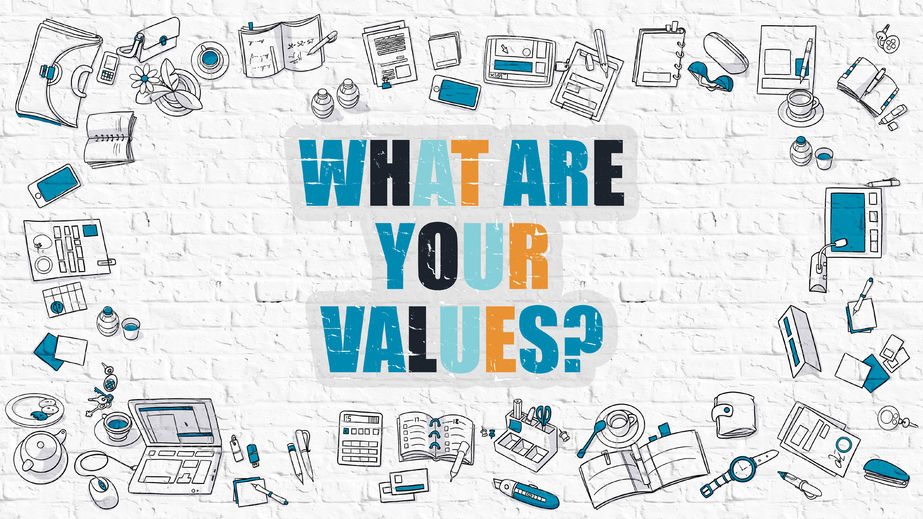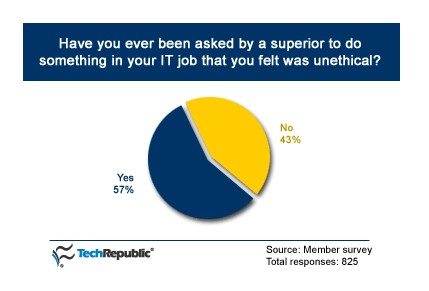Ethics and standards of conduct in managing projects

Ethics is present in all facets of life, also managing projects. In the same way that there are rules of conduct, sometimes unwritten, for everyday life, there are also rules of behaviour, a sort of code of conduct, which must be respected in the project management.
Professionals in project management, do you know the code of ethics of our profession? Do we follow standards of ethical conduct appropriate in the development of our work?
Do we realize ethically inappropriate behaviour?
First, we should consider the magnitude of the problem. Does ethically improper conduct really exist in the field of project management?
In 2002, the website TechRepublic (http: //www.techrepublic.com/) conducted a survey among its readers. Of the 825 people who responded to the questions, 57% said they had received a request from their superiors to do something that felt like it was unethical (http://www.techrepublic.com/article/it-managers-face-ethical-issues-from-piracy-to-privacy / 1054036/). This is not an isolated incident, that same year another survey by IT Consultant obtained as a result that 19% of participants had been set in their work to perform some task that was illegal/incorrect from the point of view of ethics.

What kind of unethical behaviour we are talking about?
According to respondents, in most cases faults relate to ethical behaviour area of piracy or privacy (from piracy to privacy).
An example in which both types of behaviour are combined ethically inadequate would be the case where a software unlicensed is used (which is not only it is unethical, but also illegal) for control activity workers without first informing them that this will be done.
Another very common case is based on the presentation of risks to customers. In Sometimes the Project Manager knows that present risks as they are (which is the ethically correct attitude) can result in a penalty by customers. To avoid this, do the ethically improper conduct by not showing full or hide some of the risks of the project.
A very common ethical misconduct found in the budgeting. These cases, common in the field of construction scandals come to produce media coverage, which represent an important year for the company image.
We refer here to the times when project managers perform an underestimation of the budget, they know from the beginning that it isn’t feasible to achieve that is accepted by customers. Subsequently, before the fear that the work remains unfinished, customers will accept increases budget and longer delivery times.
A good project manager and ethical conduct would show the budgets as they are, both in time and money, although it is exposing your project to potential rejection.
Is there an ethical code in project management?
In October 2006, the Project Manager Institute Board of Directors (http: //www.pmi.org/About-Us/Board-of-Directors.aspx) wrote a code to ethics and professional development, which is available free at this link (http://www.pmi.org/en/About-Us/Ethics/~/media/PDF/Ethics/ap_pmicodeofethics.ashx).
The fact that a body of international relevance in project management it has raised the need to perform a document to address ethics in project management, confirms the extent of the problem.
In short, the ethics of a Project Manager should revolve around following points.
- Be responsible. Taking decisions include assuming the consequences from them. Therefore, before taking them, you need to know all legal requirements and reflect on the ethics of behaviours that are to be taken. Knowledge of needed legislations and standards of ethical conduct are essential.
- Be respectful to yourself and others. The barrier between legal and illegality is established by the laws, but not so with ethics. Every day we perform behaviours that we know are ethically right or wrong without consulting codes behaviour, we simply rely on our common sense. The job the Project Manager (and any other) should be made with common sense, also from the point of view of ethics. Listen to others, and also within each, will help us to make our work a more ethically correct way.
- Be transparent. Transparency, putting all the cards on the table, including conflicts of interest, is another ethically correct attitude and we will talk about our own reliability and our projects.
- Be honest with your communication and behaviour. Some think that in the short-term it harms us be honest, since we can deprive some temporary privilege. However, eventually transparency and sincerity lead to confidence and since it’s so difficult find, it will constitute a positive point that will differentiate us from others.
In short, although sometimes daily life seems to show it conversely, long-term truth will eventually come to light and good behaviour is rewarded. Making our work ethical and productive shall lead to us doing better, a happier working environment and customers which are left more satisfied with the results.
Top 5 most read blogs on ITM Platform: The Monte Carlo Method in Project Management Extra Extra Extra! Three disastrous project management failures The project in the face of adversity: what should a project manager do? What is the Virtual Sock Management or Periodical Online Management?
Receive the latest blogs directly into your inbox
I agree to ITM Platform's [privacy policy](http://www.itmplatform.com/en/terms-of-use-and-privacy-policy/#PrivPol) Submit